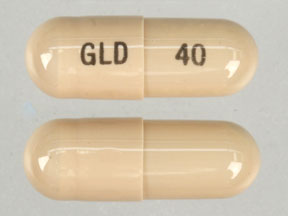Oracea Disease Interactions
There are 3 disease interactions with Oracea (doxycycline).
Antibiotics (applies to Oracea) colitis
Major Potential Hazard, Moderate plausibility. Applicable conditions: Colitis/Enteritis (Noninfectious)
Clostridioides difficile-associated diarrhea (CDAD), formerly pseudomembranous colitis, has been reported with almost all antibacterial drugs and may range from mild diarrhea to fatal colitis. The most common culprits include clindamycin and lincomycin. Antibacterial therapy alters the normal flora of the colon, leading to overgrowth of C difficile, whose toxins A and B contribute to CDAD development. Morbidity and mortality are increased with hypertoxin-producing strains of C difficile; these infections can be resistant to antimicrobial therapy and may require colectomy. CDAD must be considered in all patients who present with diarrhea after antibacterial use. Since CDAD has been reported to occur more than 2 months after antibacterial use, careful medical history is necessary. Therapy with broad-spectrum antibacterials and other agents with significant antibacterial activity should be administered cautiously in patients with history of gastrointestinal disease, particularly colitis; pseudomembranous colitis (generally characterized by severe, persistent diarrhea and severe abdominal cramps, and sometimes associated with the passage of blood and mucus), if it occurs, may be more severe in these patients and may be associated with flares in underlying disease activity. Antibacterial drugs not directed against C difficile may need to be stopped if CDAD is suspected or confirmed. Appropriate fluid and electrolyte management, protein supplementation, antibacterial treatment of C difficile, and surgical evaluation should be started as clinically indicated.
Tetracyclines (applies to Oracea) hepatotoxicity
Moderate Potential Hazard, High plausibility. Applicable conditions: Liver Disease, Biliary Obstruction
The use of tetracyclines has rarely been associated with hepatotoxicity. Histologic fatty changes of the liver, elevated liver enzymes, and jaundice have been reported, primarily in patients treated with large doses of intravenous tetracycline hydrochloride (no longer available in the U.S.) but also in patients receiving high oral doses of these drugs. Therapy with tetracyclines should be administered cautiously in patients with preexisting liver disease or biliary obstruction. Reduced dosages may be appropriate, particularly with minocycline and doxycycline, since the former is metabolized by the liver and the latter undergoes enterohepatic recycling. Liver function tests are recommended prior to and during therapy, and the concomitant use of other potentially hepatotoxic drugs should be avoided.
Tetracyclines (oral) (applies to Oracea) esophageal irritation
Moderate Potential Hazard, Moderate plausibility. Applicable conditions: Esophageal Obstruction
The use of oral tetracycline capsules and tablets has been associated with esophageal irritation and ulceration in patients who ingested the drug without sufficient fluid shortly before bedtime. Therapy with solid formulations of tetracyclines should preferably be avoided in patients with esophageal obstruction, compression or dyskinesia. If the drugs are used, patients should be advised not to take the medication just before retiring and to drink fluids liberally.
Switch to professional interaction data
Oracea drug interactions
There are 237 drug interactions with Oracea (doxycycline).
Oracea alcohol/food interactions
There are 2 alcohol/food interactions with Oracea (doxycycline).
More about Oracea (doxycycline)
- Oracea consumer information
- Check interactions
- Compare alternatives
- Pricing & coupons
- Reviews (46)
- Drug images
- Side effects
- Dosage information
- During pregnancy
- Generic availability
- FDA approval history
- Drug class: miscellaneous antimalarials
- Breastfeeding
- En español
Related treatment guides
Drug Interaction Classification
| Highly clinically significant. Avoid combinations; the risk of the interaction outweighs the benefit. | |
| Moderately clinically significant. Usually avoid combinations; use it only under special circumstances. | |
| Minimally clinically significant. Minimize risk; assess risk and consider an alternative drug, take steps to circumvent the interaction risk and/or institute a monitoring plan. | |
| No interaction information available. |
See also:
Further information
Always consult your healthcare provider to ensure the information displayed on this page applies to your personal circumstances.


